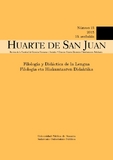Action research in the communicative language classroom: using alternative assessment techniques with efl secondary-school students
Keywords:
EFL, Secondary Education, alternative assessment, action research projectAbstract
The Council of Europe, through the Common European Framework of Reference for Language, Teaching and Assessment (CEFRL), has been promoting communicative competence since 2001. This boost has introduced some changes in the teaching-learning process of English as a Foreign Language is Spain: the methodological use of the communicative approach in the classrooms, the practice of the four skills in the class, and the theoretical implications that Gardner’s Multiple Intelligences theory has in the planning and design of classroom activities. But, in spite of that, academic results are still not very remarkable and the rates of academic failure are not decreasing since English is still a challenging subject for many Secondary School students. In addition, test evaluation is still the predominant assessment method in most of the schools. The current case study intends to provide the educational community with some results obtained from the implementation of some alternative assessment and evaluation methods in an actual high-school in Spain.
Downloads
References
Abbas, Z. (2001): «Difficulties in Using Methods of Alternative Assessment in Teaching from Iraqi Instructors Points of View», Al-Faith Journal, 48, 2012, pp. 23-45.
Council of Europe (2001): Common European Framework of Reference for Languages: Learning, Teaching, Assessment (CEFR), Cambridge, Cambridge University Press.
Dikli, S. (2003): «Assessment at a Distance: Traditional vs. Alternative Assessment», The Turkish Online Journal of Educational Technology, 2.3, pp. 13-19.
Elliot, S. N. (1995): «Creating Meaningful Performance Assessments», ERIC Digest E531: n. page. Eric Digest. Web. <http://eric.ed.gov/?id=ED381985>.
Gardner, H. (1989): «Educational Implications of the Theory of Multiple Intelligences», Educational Researcher, 18, pp. 4-10.
Janisch, C.; Liu, X.; Akrofi, A. (2007): «Implementing Alternative Assessment: Opportunities and Obstacles», The Educational Forum, vol. 71, pp. 221-230.
Louw, W. (2003): «My Love Affair with Alternative Assessment: Integrating Quality Assessment into OBE Courses for Distance Education», Progression, 25.2, pp. 21-28.
Mclaren, N.; Madrid, D.; Bueno, A. (eds.), (2005): TELF in Secondary Education: handbook and workbook, Granada, Universidad de Granada.
Miller, N. (2002): Alternative Forms of Formative and Summative Assessment, edited by John Huston and David Whigham, Glasgow Calcedonian University
Downloads
Published
How to Cite
Issue
Section
License
All articles are published under a Creative Commons (BY-NC-ND 4.0) license. Each article will be assigned a DOI.
Authors retain copyright of their work and grant the journal the right to the first publication. Authors can sign additional agreements to non-exclusive distribution of the published version of the article (for example, in an institutional repository) as long as appropriate attribution to the original publication is provided. Articles can be uploaded to institutional repositories immediately after publication.
Electronic distribution of the articles (for example, academic social networks or personal webpages) is allowed and encouraged.
The journal reserves the right to publicise the work in social networks and other electronic means.







